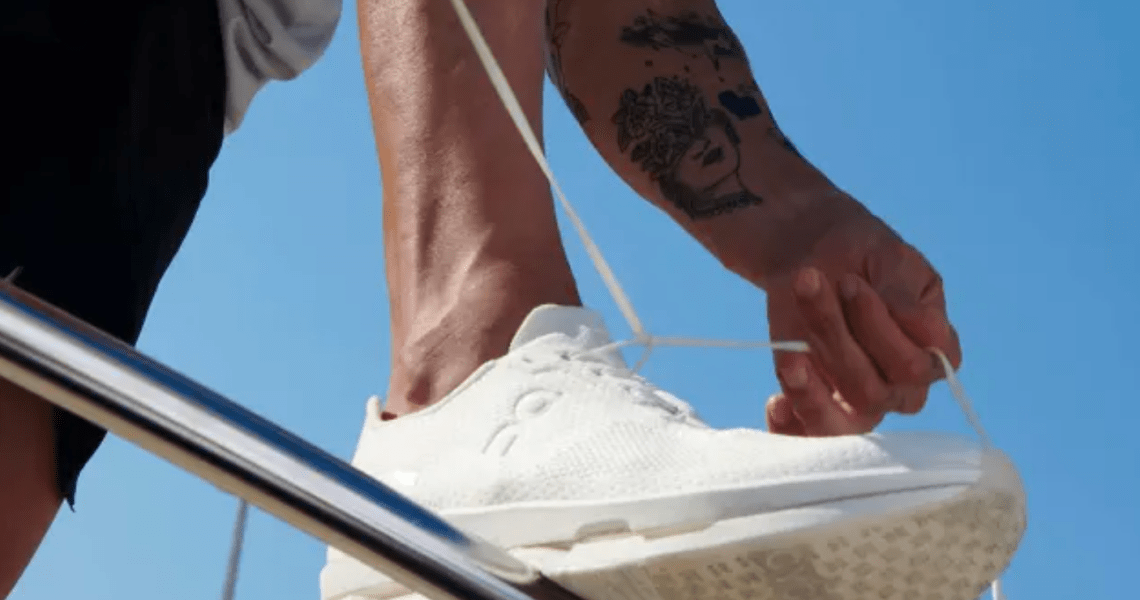Innovation and sustainability are becoming more entwined, as companies like On Running, Allbirds and Athleta focus their product design and development on getting the best of both worlds.
Rethinking performance wear with a sustainable lens is especially difficult. Products’ durability is prioritized, often forcing sustainability to fall by the wayside. But brands that are implementing sustainable practices at the design stage are proving the potential for sustainability in the category. Glossy spoke to the teams leading design at On Running, Allbirds and Athleta about how they’re designing performance clothing and shoes more sustainably. Leveraging innovative materials, and implementing design briefs and testing are among the effective strategies they listed.
For its part, On Running, which had record sales in 2021, growing 70% year-over-year to $778.7 million, focuses on material development and innovation. For example, its Cloudneo shoe style, launched in August 2022, is made from castor beans. It launched as part of a dedicated subscription program for recyclable shoes. Castor beans are a natural resource that can be turned into a bio-based polyamide, which can be used in performance shoes. The majority of the market still uses plastic for its materials. Allbirds has also leveraged castor beans, for its Wool Runner shoes, and Reebok introduced a style made from castor beans in 2020. However, On Running is leading the way, in terms of material innovations in the space. It introduced the “Cloudprime” shoe made from carbon emissions in September 2022.
“Our goal is to demonstrate that it’s possible to reuse carbon emissions and to pave the way as a climate-focused innovator in the performance footwear and apparel space. Our CleanCloud proof-of-concept is a meaningful step forward and also signals there is still significant work to be done,” said Nils Altrogge, head of technology innovation at On. The brand’s goal is to scale the technology beyond shoes and into apparel over the next 3-5 years.
Olli Hirvonen, footwear design lead at On, said the company engineers shoes based on both performance and sustainability, as a rule. “We look to design products that will make running more comfortable and enjoyable, based on the mechanics of running. With that in mind, we are also very intentional about choosing sustainable materials. Right now, we use 75% recycled polyester and we’re taking key steps to a future where every On product is fossil-free and engineered for circularity. By the end of the decade, we want to take back the majority of our products, and we are encouraging other brands to do the same.”
Allbirds has made sustainable materials a focus since launching in 2016. The brand’s main material is wool, which was used in the first shoe from the brand, dubbed the Wool Runner. Although wool is one of the oldest materials around, it is still relatively under-used in performance shoes. Other brands leveraging it include Baabuk and Le Mouton. Wool is fully sustainable, with the material breaking down in 3-4 months.
In March 2021, Allbirds also made a $2 million investment in materials innovation company Natural Fiber Welding Inc. Then, in September 2022, it unveiled a plant-based faux leather shoe. “With each of our performance launches, we are consistently looking at ways to improve the wearer’s experience while working toward our commitment to innovate with natural materials and reduce our overall carbon footprint,” said Ashley Comeaux, vp of product design at Allbirds.
The brand is also focused on finding solutions to reduce the carbon footprint of its shoes through material innovation. Its Tree Flyer shoe featuring SwiftFoam launched in May 2022. “We knew we wanted to offer a product that was lighter and had enhanced performance capabilities. To achieve this, we had to develop a new foam made of natural materials,” said Comeaux. The shoe uses the lowest energy midsole production process on the market and is 30% lighter than Allbirds’ previous foam model. It also offers increased cushioning and energy return, facilitating more bounce.
For On, the answer to sustainable product design also lies in implementing considerations around circularity, at every stage. “While brands have made recyclable products, there is little progress made around the lifecycle of products, including the ability to return products,” said Altrogge. “We quickly learned that a supply chain does not exist for circular products, and so we set forth to create our own. There are many considerations to keep in mind when developing this supply chain, including the method of transportation used, the creation of materials, and the best ways to manufacture and ship.” The result was On’s subscription program, Cyclon, granting access to its circular CloudNeo shoes and its resale site. Cyclon has earned tens of thousands of subscribers since launching in 2020.
Ad position: web_incontent_pos1
Activewear brand Athleta, which achieved B Corp certification in 2018, is also doubling down on sustainable innovation. “Innovation can be a lofty goal and a way to create pinnacle products. But at Athleta, that innovation is always through the lens of the customer,” said Felix Del Toro, chief product officer at Gap-owned Athleta, who has worked in performance wear for over 30 years. The brand uses its members-only community platform, Athleta Well, to collect feedback on product design.
“Our Transcend fabric that launched in spring was two years in the making. It’s a second-skin material made out of recycled fibers,” said Del Toro. “All of those questions about fibers, where it’s being made and what dyes are used, are asked at that initial, briefing stage of developing something. So, it’s not an afterthought.” The brand is now developing more material innovation focused on female performance and casual wear.
In its latest earnings, announced November 9, Allbirds saw a 16% year-over-year rise in revenue, reaching $72.7 million in the third quarter. Gap, which owns Athleta, and On Running will report their latest earnings next week.




